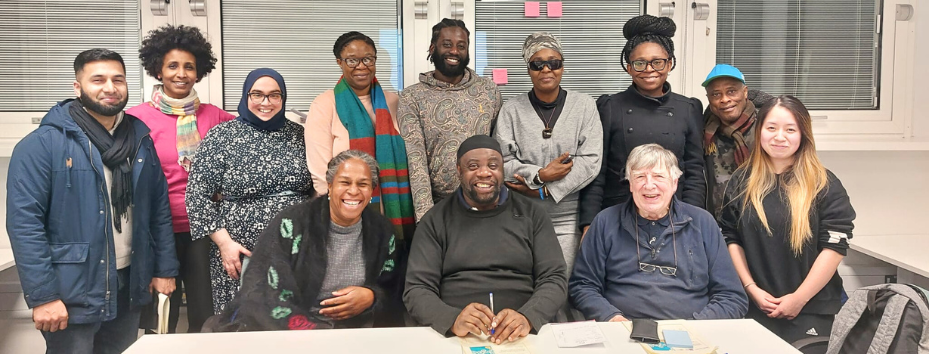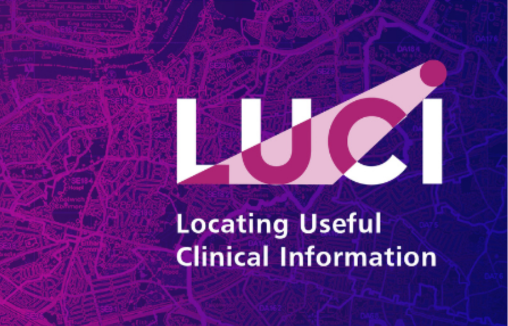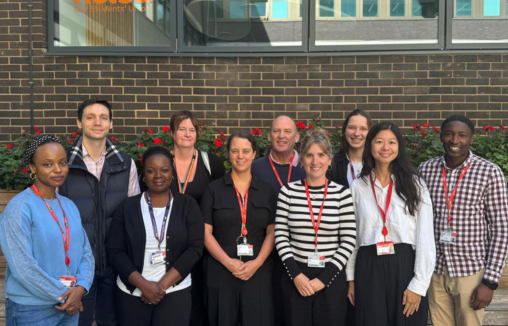Information for Patients and the Public
What is the Clinical Informatics Service (CIS)?
The Clinical Informatics Service (CIS) explores how we can work with the information that health services collect in patient electronic health records to improve patient care and make healthcare systems more effective. Patient healthcare records contain a huge amount of data which need to be managed and organised in order for clinicians to do their jobs effectively.
What is Natural Language Processing (NLP)?
The CIS uses algorithms that combine information entered in different parts of patients’ health care records to help clinicians find what they need to know more quickly. We use an artificial intelligence (AI) method called Natural Language Processing (NLP) to extract important information from text in healthcare records in a way that is much quicker and easier than manually searching thousands of records. NLP can be used to extract information on both patient care (e.g., medications and treatment plans) and social determinants of health (e.g., occupation and housing).
How can we use NLP to improve mental health services?
The CIS uses information extracted by NLP algorithms to create graphical representations of patient healthcare records (i.e., visual elements such as charts, graphs and maps) which help clinicians to make decisions about patient care and ensure that more people are receiving the right support for their mental and physical health needs. We can look at information for groups of patients as well as individuals, helping us understand whether our services are working equitably and effectively. The information extracted using NLP can also be anonymised and then used in research studies to identify trends and patterns in large patient populations. This can help researchers and clinicians make decisions about public health.
What is the Clinical Informatics Service (CIS) Advisory Group?
The Clinical Informatics Service (CIS) Advisory Group was launched in January 2024 to provide advice and feedback to the CIS and researchers working on Natural Language Processing (NLP) studies. The CIS Advisory Group meets every two months and aims to identify the priorities of SLaM service users and carers for how clinical health record data should be used for research and informing patient care. All Advisory Group members are compensated for their time and provided with training on clinical informatics and NLP development.
How can I get involved?
If you would like more information about the CIS Advisory Group or if you are interested in becoming a member of the group, please contact Zoe Chui (zoe.chui@slam.nhs.uk).
Information for Researchers
The Clinical Informatics Service (CIS) Advisory Group was launched in January 2024 to provide advice and feedback to the CIS when planning new data visualisations for clinicians and to researchers working on Natural Language Processing (NLP) studies. The CIS Advisory Group meets every two months and aims to identify the priorities of SLaM service users and carers for how clinical health record data should be used for research and informing patient care. The Advisory Group is open to researchers from the NIHR Maudsley Biomedical Research Centre (BRC) using existing NLP applications or developing new applications. NLP projects can be presented to the Advisory Group at any stage, from development and implementation through to evaluation and dissemination. The CIS Advisory Group can provide a service user and carer perspective on your study, improving the quality and relevance of your project and linking it to translational work using NLP methods to improve patient care in South London and Maudsley NHS trust. The group is an example of Patient and Public Involvement, which can improve the rigour, quality and relevance of your research.
If you are a researcher conducting a NLP-based project and would like to consult the Advisory Group, please contact Jyoti Sanyal (Jyoti.jyoti@slam.nhs.uk).
Members of the Advisory Group
 My name is Amin, and I was born in Bangladesh, where I spent my early years. I arrived in London over a decade ago and have lived in South London since then. I care for my elderly parents, who have long-term health conditions, while also working full-time in healthcare.
My name is Amin, and I was born in Bangladesh, where I spent my early years. I arrived in London over a decade ago and have lived in South London since then. I care for my elderly parents, who have long-term health conditions, while also working full-time in healthcare.
Caring for my parents has deepened my understanding of the importance of high-quality care and accessible health services. I enjoy being involved in Patient and Public Involvement (PPI) activities, and I joined the Clinical Informatic Service Advisory Group (CISAG) to contribute to the future design of healthcare systems.
I am passionate about helping healthcare professionals improve how data and information are shared across different settings, believing that these advancements will lead to better care for everyone. I hope my contributions will support the future delivery of services and help shape a better healthcare system for all.
 Aurora Todisco is a dedicated professional with extensive experience spanning finance, HR, and governance development over a 19-year period. Since April 2022, she has served as an Involvement Register member at the South London and Maudsley NHS Foundation Trust. Aurora holds a Postgraduate Diploma in Advanced Primary Care Management, enhancing her role with a deep understanding of healthcare management.
Aurora Todisco is a dedicated professional with extensive experience spanning finance, HR, and governance development over a 19-year period. Since April 2022, she has served as an Involvement Register member at the South London and Maudsley NHS Foundation Trust. Aurora holds a Postgraduate Diploma in Advanced Primary Care Management, enhancing her role with a deep understanding of healthcare management.
Passionate about fostering collaboration, she actively engages in numerous involvement and co-production activities, connecting with nearly 90 national stakeholders since 2021. Aurora's commitment to building meaningful partnerships is evident through her collaboration with academic, research, and NHS organizations. She provides valuable guidance at the Health Innovation Network South London, advising staff on involvement activity design and implementation.
Her dedication to creating positive change is demonstrated through her involvement in diverse projects, including supporting the development of the HIN Involvement Strategy. Notably, Aurora contributes significantly to the Mind & Body Strategy workshops of the King’s Health Partners Academic Health Sciences Centre (AHSC), showcasing her impactful role beyond her primary position.
 I am a Consultant, Caregiver and Service User. I have consulted on various projects and assignments collaboratively and in partnership with the Involvement Register since mid 2023; including assessments, advisory groups, co-production of resources, judging panel etc.
I am a Consultant, Caregiver and Service User. I have consulted on various projects and assignments collaboratively and in partnership with the Involvement Register since mid 2023; including assessments, advisory groups, co-production of resources, judging panel etc.
My interests are centred in exacting change using my multiple skill sets (i.e. ideas, eye for detail, researching, inquisitiveness, coordination amongst others etc.). In this project my main interest was to contribute using my experience in working with systems whilst working in the NHS clinical/medical teams; to use implementation science to make systems to produce facilities and resources to make the clinicians work easier, efficient and effective for their role.
I have been a Service User for 3 decades in relation to wellbeing (stress, anxiety, depression and suicidal ideation). I have been caregiving for 4-5 decades for family, friends; more recently a stroke survivor and cancer survivor respectively (since 2022). I have experience of working in the community both public and private sector in a wide spectrum of roles from within the NHS in administration to local community volunteering, running healthy lifestyle workshops.

Curie is a multidisciplinary Creative and Lived Experience Practitioner who is interested in innovation in health care, new developments in medical science, health data and the use of AI in medicine as well as being really excited about what the future holds for biometrics.
I have co-morbidities and hope that advances in this field will enable me to receive personalised treatment options in the near future or even a complete cure. I look forward to bringing a voice to the table and collaborating with the other members of the research team.
In my spare time I enjoy spending time with God, connecting with nature, yoga, sound baths, theatre, cinema, travelling and watching documentaries. I also care about the climate and I am passionate about social justice. I am a pescatarian.
I look forward to making a valuable contribution to this project by sharing my lived experience, contributing new ideas and insight to help shape, support and enrich the decision making process.
My name is David Kingsley, and I was born and raised in South West London, now living in West London. As a service user within the NHS, I’ve gained valuable firsthand experience navigating both primary and secondary care services. This has shaped my understanding of the patient journey, giving me a unique perspective on how to improve services for others.
Outside of healthcare advocacy, my hobbies include creating fashion garments, music, writing, and gaming. These creative activities allow me to unwind and stay connected to my passions, while also fuelling my creativity in other areas of my life.
I joined the Clinical Informatic Service Advisory Group (CISAG) to advocate for better patient experiences, using my own experiences to help drive positive changes within the healthcare system. In addition to my lived experience, I bring professional skills as an expert by experience (EbE) and a mental health first aider, aiming to enhance patient outcomes through collaboration and empathy.
I am Julius, a night time support worker who works with vulnerable adults suffering from multiple conditions such as dementia, autism, mental health and other forms of disabilities living in South London. My hobbies are Reading and writing books on African Politics and History. I am an author of published books and some unpublished manuscripts on Nigerian politics. I bring both lived and professional experience to the Clinical Informatic Service Advisory Group.
 I joined the Clinical Informatics Service Advisory Group (CISAG) because I have a keen interest in digital and technology, understand the NHS and in particular mental health not only as a professional but also as a patient.
I joined the Clinical Informatics Service Advisory Group (CISAG) because I have a keen interest in digital and technology, understand the NHS and in particular mental health not only as a professional but also as a patient.
I joined the South London and Maudsley NHS Foundation Trust Involvement Register when I was discharged from COAST which is the early intervention team for people who have psychosis. I still suffer from auditory hallucinations but it is well managed. I ran a walking group for patients with psychosis and I also help a number of people with mental health problems to navigate the system.
I am a board member of the South London Mental Health and Community Partnership which provides services for three mental health trusts. I also advice on various sub groups in this organisation. I am also an advisory member of the Art Group based at Bethlem but provides advice and input for the various art and projects across the buildings of the SLaM trust.
I have been a qualified pharmacist since 1998. I have worked in community pharmacy, hospital and primary care pharmacy in a commissioning organisation. I am currently the Lead Primary Care Mental Health Pharmacist for NHS Surrey Heartlands Integrated Care Systems and my role is to manage queries from primary care (GP practices) and interface issues had with secondary care (hospitals). I am also involved in setting up new commissioned services to reduce the wait time for patients that need to see an ADHD specialist. I am also leading on optimising the prescribing of antidepressants, as well as supporting stopping of antidepressants for those patients who wish to and where it is clinically appropriate to do so, using the new information and evidence on this which has only recently been identified. I am also the Digital expert for my medicine management team. I lead on health and well being for the medicine management department. For this I also run walking challenges to keep people healthy and motivated. I am also qualified as a mental health first aider. I also have my own business called iRx Solutions Ltd and this is a consulting pharmacy business providing medication reviews to patients on multiple medicines and education for other health care professionals.
I enjoy photography, travelling (usually to some unusual place for example Yemen, Sierra Leone and Galapagos). I enjoy cooking healthy vegetarian food, cakes, bread and ice cream too (not always so healthy). I love the game sequence and always looking for new players to challenge me. I dabble in art - various different methods and generally abstract. I really like relaxing and mindfulness when I undertake diamond painting work or colouring in.
I was born in London, grew up in south London my whole life. I enjoy playing video games and anime and I love animals. I joined the Clinical Informatics Service Advisory Group (CISAG) because I’m interested in technology and improving the services for patients and staff. I have a design background and enjoyed creating the design side of the CIS. I also have lived experience using mental health services.
I was born in the city of Bristol and spent my early childhood there before moving to London at the age of 17. I resided in Lambeth for five wonderful years before moving to Lewisham where I still reside, so in total I have lived in south London for over 37 years. My hobbies vary from mood but I enjoy cycling, camping, reading and drama which is my favourite hobby. I joined the Clinical Informatics Service Advisory Group because of my passion to have the patient voice heard and how their personal data is used and managed. Also how better to use this information to improve clinical services and commissioning. My skills I bring to the group include lived experience in mental health and well-being, through my work and drama.
My name is Monique, I’m 40 years old, born and raised in west London. I’m a novice gardener and an unpaid carer. I found the Clinical Informatics Advisory Group via social media and wanted to build my confidence around mental health. I wanted to be part of the change towards mental health disparity post-pandemic, concerning primarily Afro-Caribbean people in the UK.
 My interest in mental health began in 1994, when I became a carer when my daughter was diagnosed with schizophrenia, and subsequently became an expert by experience (EBE). My involvement in research developed when I obtained an MSc in July 2000. I joined the charity, Rethink as a carer support worker in Croydon in 2002. My interest in PPIE began in 2004 when I had the opportunity to become a carer representative on one of the Mental Health Research Network (MHRN) hubs until the transition to the Clinical Research Network in 2014. During this period, I was an active member of the MHRN London Hub’s PPI Advisory Group, and was involved in many of the group’s achievements, including the FAST-R (Feasibility And Support to Timely recruitment for Research) Service, which is now managed by NIHR Maudsley Biomedical Research Centre since 2015, where I am still a reviewer advising on information sheets, consent forms, lay summaries, and PPI aspects of applications. I have attended various scientific meetings and research seminars over the years including research training courses organised by MHRN, Biomedical Research Centre, and others.
My interest in mental health began in 1994, when I became a carer when my daughter was diagnosed with schizophrenia, and subsequently became an expert by experience (EBE). My involvement in research developed when I obtained an MSc in July 2000. I joined the charity, Rethink as a carer support worker in Croydon in 2002. My interest in PPIE began in 2004 when I had the opportunity to become a carer representative on one of the Mental Health Research Network (MHRN) hubs until the transition to the Clinical Research Network in 2014. During this period, I was an active member of the MHRN London Hub’s PPI Advisory Group, and was involved in many of the group’s achievements, including the FAST-R (Feasibility And Support to Timely recruitment for Research) Service, which is now managed by NIHR Maudsley Biomedical Research Centre since 2015, where I am still a reviewer advising on information sheets, consent forms, lay summaries, and PPI aspects of applications. I have attended various scientific meetings and research seminars over the years including research training courses organised by MHRN, Biomedical Research Centre, and others.
I joined the Patient Advisory Group (PAG) of the Research Design Service (London) in November 2014 undertaking regular reviews of grant applications and lay summaries as an EBE. In April 2016, I joined the NIHR Maudsley BRC Service User and Carer Data Linkage Group advising applicants. In September 2019 I joined the South London and Maudsley NHS Foundation Trust Cogstack Oversight Committee.
Over the years I have been a participant in various focus groups, EBE and co-producer in some studies. Among my achievements include seeing an idea for a conversational coaching skills for Carers course develop since 2012 with the help of a specialist agency which delivers training to NHS staff, and co-delivered courses to carers in the South London and Maudsley NHS Foundation Trusy boroughs.








